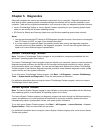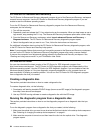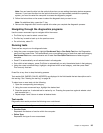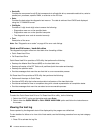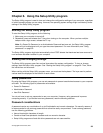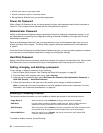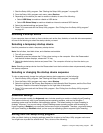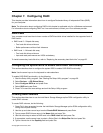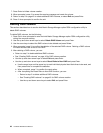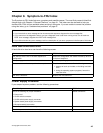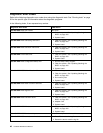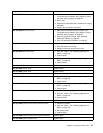
1. Start the Setup Utility program. See “Starting the Setup Utility program” on page 39.
2. From the Setup Utility program main menu, select Devices.
3. Depending on the device you want to enable or disable, do one of the following:
• Select USB Setup to enable or disable a USB device.
• Select ATA Drives Setup to enable or disable an internal or external SATA device.
4. Select the desired settings and press Enter.
5. Press F10 to save and exit the Setup Utility program. See “Exiting from the Setup Utility program”
on page 41.
Selecting a startup device
If your computer does not start up from a device such as the disc, diskette, or hard disk drive as expected,
do one of the following to select the startup device you want.
Selecting a temporary startup device
Use this procedure to select a temporary startup device.
Note: Not all discs, hard disk drives, and diskettes are bootable.
1. Turn off your computer.
2. Repeatedly press and release the F12 key when turning on the computer. When the Please select
boot device window displays, release the F12 key.
3. Select the desired startup device and press Enter. The computer will start up from the device you
selected.
Note: Selecting a startup device from the Please select boot device window does not permanently change
the startup sequence.
Selecting or changing the startup device sequence
To view or permanently change the congured startup device sequence, do the following:
1. Start the Setup Utility program. See “Starting the Setup Utility program” on page 39.
2. From the Setup Utility program main menu, select Startup.
3. Select the devices for the Primary Boot Sequence, the Automatic Boot Sequence, and the Error Boot
Sequence. Read the information displayed on the right side of the screen.
4. Press F10 to save and exit the Setup Utility program. See “Exiting from the Setup Utility program”
on page 41.
Advanced settings
On some computer models, the Advanced menu includes a setting to enable or disable HyperThreading.
This feature works only with HyperThreading-aware operating systems, such as the Windows 7
operating system and the Windows Vista operating system. The default setting for HyperThreading is
enabled. However, if you are not using a HyperThreading-aware operating system and the setting for
HyperThreading is Enabled, your computer performance might be degraded. Therefore, you should always
set HyperThreading to Disabled unless you are sure your operating system supports HyperThreading.
Exiting from the Setup Utility program
After you nish viewing or changing settings, press Esc to return to the Setup Utility program main menu.
You might have to press Esc several times. Then, do one of the following:
Chapter 6. Using the Setup Utility program 41



